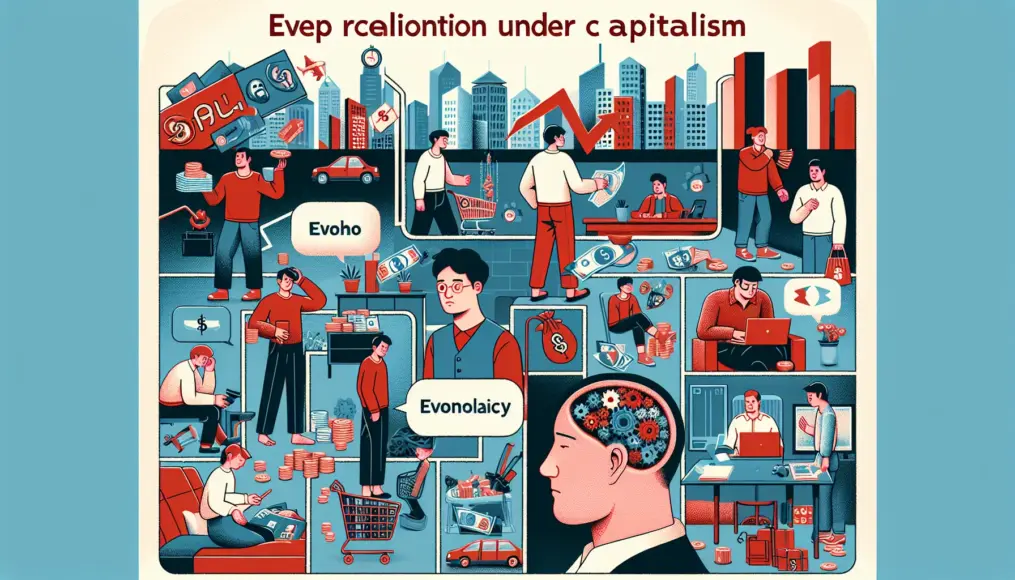When we think about the psychology of capitalist societies, we realize how our economic activities influence our mental states—and vice versa. Understanding how economic trends and policies affect our emotions and thoughts is a crucial topic in today’s world.
In this blog, we’ll delve into the intricate relationship between capitalism and psychology. Striking a balance between our mental well-being and economic realities is essential. We’ll explore the effects of economic policies on our psychological state and examine the relationship between stress and economic activities. So, join us on this insightful journey!
- An in-depth exploration of the interaction between capitalism and psychology
- Insights into how economic policies impact individual minds
- Strategies for maintaining mental health in a capitalist context
By engaging with these themes, we hope to shed light on the ways in which our financial environment shapes not just our wallets, but also our hearts and minds.
The Interaction Between Capitalism and Psychology
In capitalist societies, the relationship between the economy and our mental states is deeply intertwined. Our daily lives and emotional well-being are often influenced by economic trends and policies. For instance, during times of economic growth, people tend to feel more optimistic, while in times of recession, anxiety and stress can increase significantly. This illustrates how economic conditions affect our mental health in various ways.
In this section, we will explore how the economy impacts our minds and examine capitalism through a psychological lens. By understanding how economic factors influence our thoughts and behaviors, we can discover strategies to maintain our mental well-being.
The Impact of Economic Conditions on Mental Health
As capitalism evolves, our minds become increasingly sensitive to economic fluctuations. When the economy is thriving, job opportunities tend to increase, providing people with a greater sense of security. This can lead to improved mental health. However, when the economy takes a downturn, fears around unemployment and reduced income can cast a shadow over our minds, leading to heightened stress and anxiety.
The influence of economic conditions on mental health is profound. For those who struggle to keep up with economic changes, the risk of deteriorating mental health becomes significantly higher. Therefore, in a capitalist society, it is crucial to deepen our understanding of economic dynamics and find ways to safeguard our mental health.
- Economic growth enhances feelings of security
- Anxiety during recessions impacts mental well-being
- Understanding economic conditions contributes to mental health
Capitalism Through a Psychological Lens
From a psychological perspective, capitalism has a significant impact on our behaviors and thought processes. For example, the rise of consumerism emphasizes the pursuit of material wealth, which can shape our self-perception and interpersonal relationships. Investigating how these values affect us is a critical area of psychological research.
Additionally, the intensifying competition within capitalism increases pressure related to success and failure. Understanding how this pressure affects people’s psychology and how it can jeopardize mental health is essential in today’s society.
- Consumerism influences self-perception
- Pressure from competition impacts mental health
- Psychological perspectives on protecting mental well-being
Economic Policies and Personal Psychology
Economic policy is a crucial tool for regulating a nation’s economic activities, but its effects reach far beyond just the financial realm; they deeply influence individual psychology as well. When policies change, our living conditions and job stability can be affected, leading to shifts in our mental state. In this section, we will explore how economic policies impact personal psychology and reevaluate these policies from a psychological perspective.
While economic policies aim for overall growth and stability for a nation, understanding their effects on individuals’ minds is essential. By gaining deeper insights into this relationship, we can identify strategies to maintain mental well-being.
The Psychological Impact of Policy Changes
When economic policies are implemented, individuals respond in various ways. For instance, reforms in tax systems or adjustments to welfare programs can have direct impacts on daily life, often evoking feelings of reassurance or anxiety. If a policy is perceived as beneficial, individuals are more likely to maintain a sense of mental stability. Conversely, if they face adverse effects, stress levels may rise.
Moreover, changes in economic policies can influence the overall atmosphere of society. For example, when policies aimed at promoting economic growth are enacted, people often experience a surge in expectations and hope, leading to positive psychological impacts. Thus, there exists a cycle where economic policies directly affect mental states, which in turn influence economic activities.
- The Impact of Economic Policies on Daily Life
- Changes in Feelings of Security and Anxiety Due to Policies
- The Connection Between Societal Atmosphere and Psychology
Viewing Economic Policies Through a Psychological Lens
From a psychological standpoint, economic policies significantly influence people’s behaviors and choices. For example, when the government introduces policies aimed at stimulating economic growth, individuals tend to increase their consumption. This trend is driven by expectations and hopes for the economy’s future. On the other hand, when policies are unclear, people often experience anxiety, leading them to curtail their economic activities.
Additionally, it’s important to consider how economic policies can affect individuals’ values and beliefs. For instance, when policies emphasizing environmental considerations are promoted, individuals may become more environmentally conscious, resulting in lifestyle changes. The relationship between economic policies and psychology is complex and requires a multifaceted perspective.
- The Influence of Economic Policies on Behavior and Choices
- The Relationship Between Policy Transparency and Anxiety
- The Potential for Policies to Shift Personal Values
Mental Health in a Capitalist Society
In capitalist nations, while economic activity thrives, mental health often faces significant challenges. The intense competition and economic uncertainties can lead to stress and anxiety, putting a strain on our mental well-being. This chapter explores the importance of mental health in a capitalist society and delves into the relationship between economic activities and stress.
We will also discuss strategies to maintain mental wellness. By understanding how economic activities impact our minds, we can discover concrete ways to foster better mental health.
Stress and Economic Activity
In a capitalist society, economic activity is at the heart of our daily lives. Consequently, work performance and economic conditions can greatly influence our mental state. Particularly during unstable economic times or in highly competitive workplaces, stress tends to escalate. This stress can seriously undermine our mental health.
Moreover, the psychological effects of economic pressure are closely linked to individual mental health. Concerns about unemployment or decreased income can adversely affect self-esteem and personal relationships. To navigate these challenges, it’s crucial to recognize the sources of stress and find effective coping strategies.
- The impact of economic activity on mental stress
- Increased stress during economic instability
- How stress affects mental health
Ways to Maintain Mental Health
To preserve mental health, it’s essential to understand the stressors present in a capitalist society and implement appropriate measures. First and foremost, consciously managing mental health is vital. This can involve engaging in relaxation techniques or dedicating time to hobbies, both of which can help alleviate stress. Additionally, regular exercise and a balanced diet play a significant role in supporting mental wellness.
Moreover, nurturing connections with others is a key component of maintaining mental health. Communicating with friends and family allows us to share feelings and support one another, enhancing our psychological stability. Protecting mental health hinges on self-care and the quality of our relationships with others.
- Engage in relaxation and hobbies
- Regular exercise and balanced nutrition
- Prioritize communication
Finding Balance Between Mental Health and Economic Activity
In capitalist societies, while economic activity thrives, prioritizing mental health is equally important. The relentless pursuit of financial success can often lead to increased stress and anxiety, compromising our mental well-being. This chapter explores ways to strike a balance between mental health and economic pursuits, offering practical approaches to maintain mental well-being while engaging in economic activities.
By prioritizing mental health, we can positively influence our economic engagements. Achieving mental stability allows for better decision-making and enhances job performance. Thus, a holistic approach that considers both mental and economic factors is essential.
Economic Activities that Prioritize Mental Health
Economic activities that emphasize mental well-being go beyond mere profit maximization; their goal is to enhance people’s happiness. When businesses and individuals engage in economic activities with mental health in mind, it can lead to long-term success. For instance, creating a stress-free work environment and implementing flexible work arrangements can help maintain employees’ mental health.
Moreover, mindful consumer choices are vital when it comes to spending. By avoiding unnecessary expenses and excessive consumption, individuals can make decisions that are kinder to their mental state, ultimately achieving both economic stability and mental well-being.
- The Importance of Mental Health in Economic Activities
- Creating a Stress-Free Work Environment
- Mindful Consumer Choices
Strategies for Maintaining Psychological Stability
To maintain psychological stability, it’s essential to integrate mental care into daily routines. First, setting aside regular relaxation time or engaging in hobbies can effectively alleviate stress. Incorporating mindfulness and meditation practices can help center the mind, enhancing our ability to think clearly and make sound judgments.
Additionally, seeking support is crucial. Sharing feelings with friends and family can ease emotional burdens. Maintaining psychological stability involves not just self-care but also nurturing relationships with those around us.
- Regular Relaxation and Hobby Time
- Practicing Mindfulness and Meditation
- Valuing Communication with Those Around You
Conclusion
The relationship between mental well-being and the economy in capitalist societies significantly impacts our daily lives. Economic policies and market trends directly influence our psychological state, creating a complex interplay that, in turn, affects economic activities. By prioritizing mental health, we can enhance economic performance and achieve sustainable growth.
To maintain mental well-being, it’s essential to have concrete strategies for managing stress and ensuring psychological stability. Striking a balance between economic activities and mental health can improve the overall happiness of individuals and society as a whole. Adopting this perspective is becoming increasingly important in the future of capitalist societies.
- In capitalist nations, the economy and mental health influence each other.
- Prioritizing mental health positively affects economic activities.
- Methods for managing stress and maintaining psychological stability are crucial.
Protecting mental health serves as a foundation for better economic activities. If you have thoughts or opinions inspired by this article, we’d love to hear from you in the comments!



Comment